How often you wash your hair might seem like a trivial thing. It’s a given that you need to cleanse your body and hair on a regular basis, but while showering everyday is generally recommended, is it a good idea to wash your hair on a daily basis?
- Less Is More
- You’re Actually Washing Your Scalp (More Than Your Hair)
- What Hair and Scalp Type Do You Have?
- Do You Exercise (and Sweat) A Lot?
- Do You Use Styling Products?
- Do You Have Colored or Chemically Treated Hair?
- How Long Is Your Hair?
- Environmental Factors
- Over a Certain Age? Wash Less Often
- What About Co-Washing?
- To Shampoo or To No Poo?
- Dry Shampoo
- So How Often Should You Wash Your Hair?
Less Is More
For the most part, it’s better to lather, rinse (and repeat) every other or every few days to avoid drying hair out.
Of course, how often you should wash your hair depends on a combination of factors – your hair type, lifestyle, and environmental surroundings, to name a few. You’ll also want to consider what you wash your hair with too – commercial shampoo isn’t your only option.
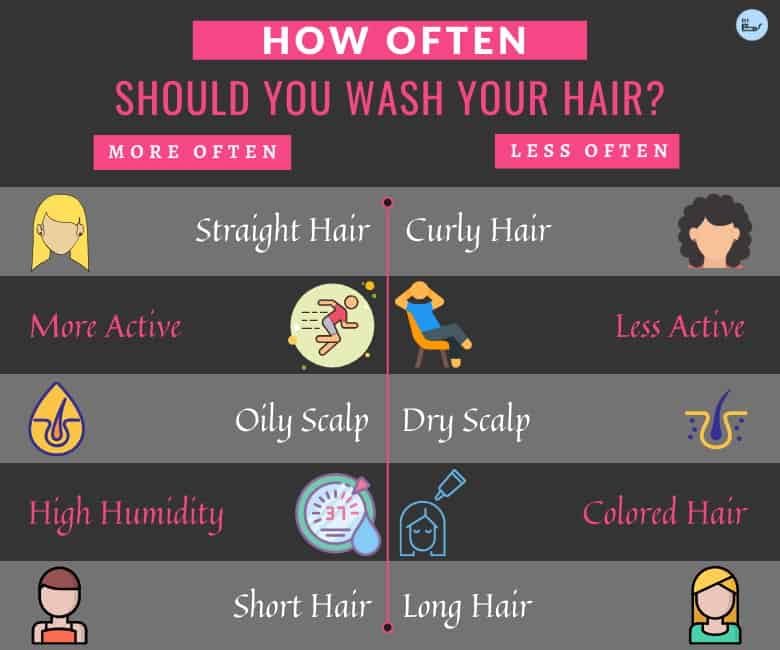
You’re Actually Washing Your Scalp (More Than Your Hair)
On average, most people should wash their hair 2-3 times a week. The main reason for scrubbing with shampoo is to actually wash your scalp. Hair is really a secondary priority since the natural oil that keeps your skin and hair conditioned – sebum – is produced by sebaceous glands on your scalp.
The problem with most shampoos is that the ingredients that remove oil, dirt and grime also strip your skin and tresses of any moisture. Shampoo too often and your hair can become dry, brittle and lose shine. Your scalp may also start flaking dead skin or become irritated.
Here’s what you should think about:
What Hair and Scalp Type Do You Have?
The main consideration for determining how often you should wash your hair is this. Thick or curly hair requires less frequent washes while straight or fine tresses usually need more.
This is because your natural oils travel down straight, thin strands more easily, conditioning and moisturizing them. Silky, fine hair tends to get greasy and dirty more easily, while the curves and bends in curly hair prevent oil from coating the cuticle as easily, leaving them drier and more prone to breakage.
Likewise, your scalp type makes a difference too – an oily scalp requires more frequent washing, and a dry one less so. Normal scalps generally need to be washed around 2-3 times per week.
So how do you know what scalp type you have?
If your roots look really greasy unless you wash your hair everyday, you have an oily scalp. Dry scalps can go as long as a week before they start to look dirty and greasy.
Where it gets tricky is if you have combination scalp. It takes a little more finessing since you need to cleanse the oily areas without drying out the dry areas. It helps to use milder shampoos that don’t contain harsh cleansing agents or sulfates, and condition your ends well so you’re not over-drying your hair.
Do You Exercise (and Sweat) A Lot?
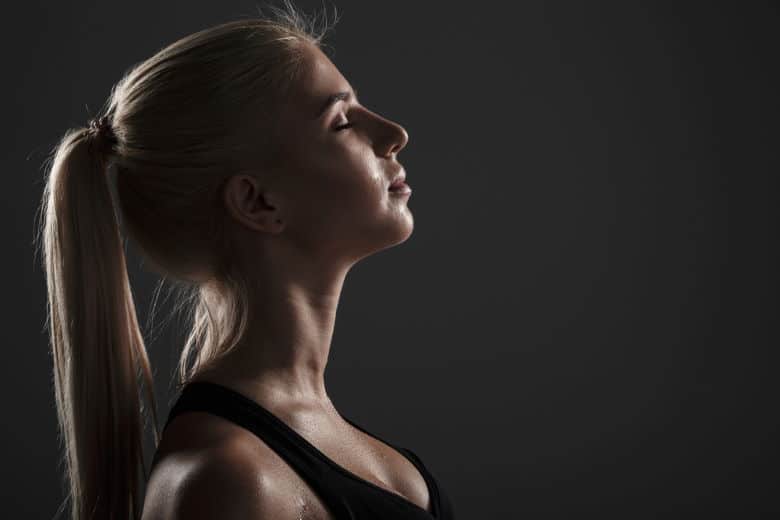
Clearly, another major consideration is your lifestyle and activity level. If you hit the gym everyday and sweat like a hog, you’ll likely need to wash your hair on a daily basis. If not, excess sweat will eventually clog the pores on your scalp, which can lead to dirty hair, itchy scalp, or scalp acne.
That doesn’t mean you necessarily need to shampoo everyday though – alternate washing with just water or conditioner (a.k.a. co-washing) every other day to keep you clean without stripping your head of your natural oils.
Do You Use Styling Products?
Aside from sweat and oil, buildup from styling agents like mousse, gel, or hairspray will also determine how often you need to wash your hair.
The more product you use, the more residue will accumulate on your strands. You’ll want to at least rinse your hair every couple of days to remove excess buildup that can weigh it down or irritate your scalp.
On the other hand, if you get blow outs or regularly use heat-styling tools, you’ll want to stretch the time between washes so you a) get the most out of your style, and b) reduce the amount of wear and tear on your locks.
Do You Have Colored or Chemically Treated Hair?
This is a biggie – if you color or relax your hair chemically, you definitely want to avoid washing your hair too often. Dyes and chemicals erode the hair shaft by penetrating the cuticle layer to reach the core, which weakens your strands.
Colored-treated hair will fade more quickly and start to look dull the more you wash your tresses, so be sure to use shampoo that’s specially formulated for colored hair.
In both cases, you’ll also want to condition, condition, condition to hydrate locks as much as possible.
Generally speaking, try to go for at least 3 days between washes or use dry shampoo on non-wash days to keep excess oil at bay.
How Long Is Your Hair?
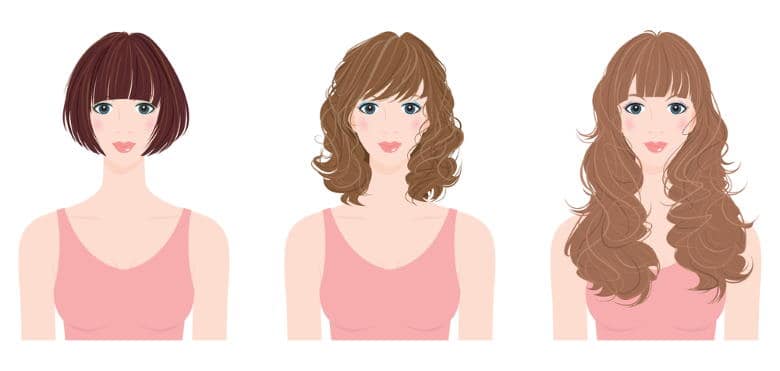
Your hair length makes a difference too – shorter styles are usually easier to care for, and in this case, it means you can wash more frequently without drying your locks out.
This is because short hair is more virginal – the closer your hair is to the root, the newer and stronger the strand is. With long hair, the closer you get to the tips, the more delicate and fragile it is, which can manifest as split ends if your hair is damaged.
Increasing the time between washes allows your natural oils to make their way down the length of your strands with daily brushing, conditioning them for more shine and less frizz.
 Quick Tip:
Quick Tip:
If the idea of having oily roots between washes puts you off, put your hair in an updo on non-wash days. I find that my hair holds better in an updo when it’s not freshly washed. It’s a great twofer because it helps hide grease as it keep your ponytail, braid, or french twist in place for the full day.
Environmental Factors
Lastly, you’ll also want to consider the environment you live in. If you reside in an area with hard water (i.e., water with a high mineral content), you may notice your hair feeling like straw if you wash it too often.
Hard water is very drying to both skin and hair, so it’s especially important to condition hair thoroughly to ensure that it isn’t entirely stripped of moisture. You may even want to apply a hair mask once a month if your hair is really dry and brittle.
Conversely, if you live in a hot and humid region, you’ll be sweating more and likely need more frequent washings. Again, this doesn’t necessarily mean you need to lather up – a simple rinse may be all you need to clean your scalp and hair.
Likewise, air pollution, dead skin in the form of scales, and yeast will naturally accumulate in your hair after a while. It’s important to strike a balance between washing too often and not washing often enough.
Over a Certain Age? Wash Less Often
As you start to get into your golden years, your hair will start to change in texture, getting thinner and more brittle. Particularly if you’re female, changing hormones and less oil production naturally leave your scalp drier than in your younger years, reducing the need for frequent washes.
On top of that, if you use dye to cover grays, there’s added chemical stress on delicate strands, leaving them doubly dry and more prone to breakage. You can reduce shampooing down to once a week, or follow the co-wash or no-poo methods below.
What About Co-Washing?
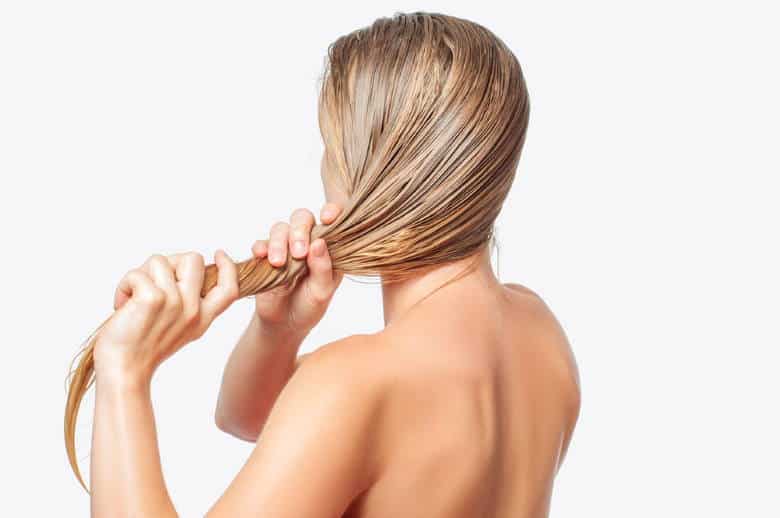
“Co-washing”, which means conditioner-only washing, is increasingly popular for those with curly, drier hair types since it doesn’t strip your hair of moisture the way most shampoos do. The purpose is to replace shampoo with conditioner to clean your scalp and hair (i.e., you’re not just conditioning your hair, but massaging your scalp with conditioner to remove grease and dirt).
Scrubbing your scalp with conditioner works, but if you’re worried that it won’t clean as well, cleansing conditioners are available that contain very mild ingredients to help remove dirt and grime for a more clean feeling.
Additionally, you can alternate co-washing with regular shampooing, or do what I call “mo-co-washing” or mostly conditioner washing.
For those days when my hair isn’t all that dirty but I’ve worked up a sweat with a high-intensity cardio workout, I use a very small amount of shampoo on the areas of my scalp where needed, like the hairline and behind the crown of my head. Then I wash the rest with conditioner (and condition my ends as usual afterwards).
With co-washing, you’re free to wash more often if your hair doesn’t get too dry since it cuts out the harsh stripping effect of shampooing.
To Shampoo or To No Poo?
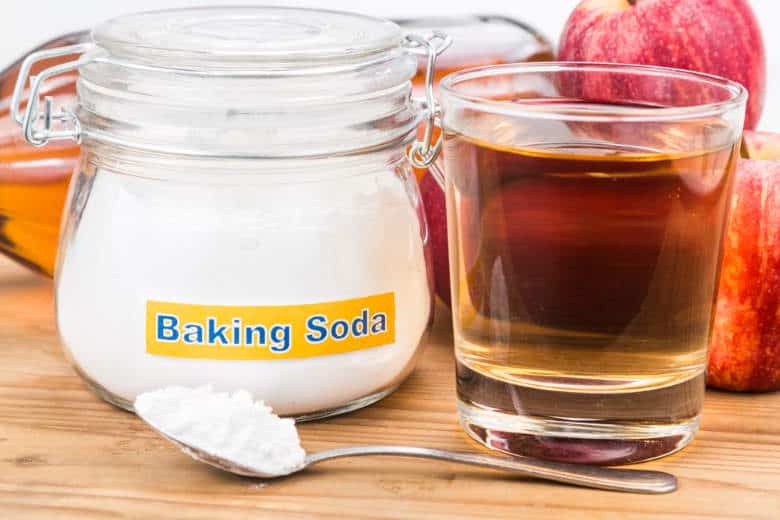
If you want to take things one step further, there’s also the no-poo method, which, like co-washing, means you don’t use shampoo to clean your locks. No Poo is a broad method that can mean anything from washing with water only (yes, really) to using household products like baking soda and apple cider vinegar instead of commercially-available hair products.
While there are many ways to no poo, the basic premise is to not lather up with shampoo. The bubbles in most shampoos come from the addition of sulfates, most commonly sodium lauryl sulfate and sodium laureth sulfate.
Sulfates are found in many products like household detergents and cleaners because they are good at cutting through oil and grease. The problem is, their cleansing effectiveness strips too much natural oil away from your locks if you shampoo too often.
Like co-washing, you can no poo everyday if you want since you’re not subjecting your scalp and hair to harmful toxins or irritating chemicals.
Dry Shampoo
One way to extend the time between washings is to use dry shampoo to keep oil on your scalp at bay.
Dry shampoo generally comes in spray form, with either an alcohol or starch base that helps absorb oil so your hair doesn’t appear greasy. Apply it to roots on non-wash days so your hair can stay fresher and more voluminous longer.
It’s important to apply dry shampoo properly so you get the benefits of extending the period between washes. Overuse can lead to scalp irritation and residue build up, which defeats the purpose.
Additionally, dry shampoo isn’t a replacement for wet shampoo – you still need to wet and wash your scalp and hair on a regular basis to keep germs, flakes, and product buildup from accumulating.
So How Often Should You Wash Your Hair?
If you’re still not sure how often you should wash your hair – and you currently wash daily – start by extending the time between washes a day at a time. Give your scalp and hair a few weeks to adjust to your new routine before deciding if it’s right for you.
If you’ve been shampooing daily, your sebaceous glands will be used to overproducing sebum to compensate for the regular removal of oil. At first, your roots may look and feel a bit greasy while you incorporate non wash days into your routine, but that should become less of an issue as your scalp adjusts to less frequent shampooing.
With a little trial and error, you should be able to find a good schedule that keeps your hair clean, healthy, and soft. And who knows – with less frequent shampooing (or full on no-pooing), you might even save some money to boot!